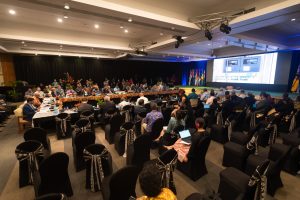The politics of who is attending the 51st Pacific Islands Forum Leaders’ Meeting being held in Suva this week continues to dominate this all-important reunion of Pacific leaders at a time of unprecedented environmental and geopolitical challenges that have placed enormous stress on the regional body.
The Pacific Islands Forum (PIF) comprises of 18 member states, but four are not sending their leaders to Suva. At the start of the week, news leaked that Kiribati’s president, Taneti Maamau, had formally withdrawn his nation from the forum. Maamau’s chief reason for the drastic decision was his ongoing frustrations about the way the forum selects its leadership. Last year, the election of the former Cook Islands prime minister, Henry Puna, as the forum’s secretary general prompted the bloc of five Micronesian nations (Kiribati, Republic of Marshall Islands, Palau, Federated States of Micronesia, and Nauru) to threaten to depart the organization en masse effective in 2022. Furious repair diplomacy ensued, leading to a “gentleman’s agreement” signed in Suva a month ago that was thought to have put the Micronesian grievances to rest. Yet Maamau claimed he was not consulted and did not offer details of how the “gentleman’s agreement” could have appeased Kiribati.
The repercussions of the Kiribati departure are being powerfully felt in Suva, as they are in Kiribati. The country’s opposition leader Tessie Lambourne told the Australian Broadcasting Corporation’s Pacific Beat program that the decision did not benefit her nation and stressed that Kiribati’s needs were best met by staying within the forum and continuing to engage in “dialogue and diplomacy.” She also felt “optimistic” that Kiribati would return to the PIF, though she hoped there “had not been influence on our government’s decision” to leave “from other external sources.” Lambourne was carefully referring to the influence of China. In the days since Kiribati’s forum departure came to light, many see the fingerprints of China all over Maamau’s decision.
In addition to an absent Kiribati, the Republic of the Marshall Islands (RMI) is absent from Suva this week. The reason for the RMI’s absence stems from governmental processes enacting their forum withdrawal coming into effect even though President David Kabua no longer wishes to remove his nation from the regional body. The “gentleman’s agreement” rapprochement of June 2022 came too late to reverse the internal processes already set in motion. This state of affairs likewise caused waves in Suva and moreover in Majuro, with Speaker Kenneth Kedi saying “unfortunately we are battling amongst ourselves.”
Then there is Nauru, whose prime minister, Lionel Aingimea, is not attending due to the state of the COVID-19 pandemic, while Cook Islands Prime Minister Mark Brown is also staying home due to national elections in three weeks.
Disinvited from the PIF Leaders’ Meeting were all dialogue members, though two of them – China and the United States – are nevertheless making their presence felt. China’s ambitious attempt to create a bloc of “China-Pacific Island nations” through the forum in May was rebuffed. The move prompted a decision to allow member states the space to discuss pressing geopolitical issues amongst themselves without the presence of other nations “external” to the “forum family.” China has a recent history of exerting pressure at the forum, such as in 2018 when host-nation Nauru, one of the four Pacific nations still recognizing Taiwan, cited China for aggressive conduct and called for an apology.
Though not present in Suva, China is casting an immense shadow over the proceedings through Kiribati’s withdrawal, the controversial security treaty that the Solomon Islands signed with China in April, and through the issues of fishing and the myriad ways China is engaging each forum member.
On July 13, despite the lack of an invitation to the Suva talks, U.S. Vice President Kamala Harris addressed forum leaders remotely. She announced a further expansion of the rapidly upscaled U.S. diplomatic presence in the region (new embassies in Tonga and Kiribati will open soon), as well as an upscaling of investment in development, chiefly through resuming Peace Corps operations, and targeting the chief regional concern of climate impacts and ocean health.
Following the adverse regional reception of the U.S.-led and recently announced Partners in the Blue Pacific initiative that seeks to better align Pacific aid and development efforts of the U.S., Australia, New Zealand, Japan, and the United Kingdom, the U.S. government needs to deliver fast and in ways that the Pacific Island nations want and need. Within the fraught politics of this PIF Leaders’ Meeting, that Harris was permitted to speak has been described by I-Kiribati journalist Barbara Dreaver as a “diplomatic coup.”

































